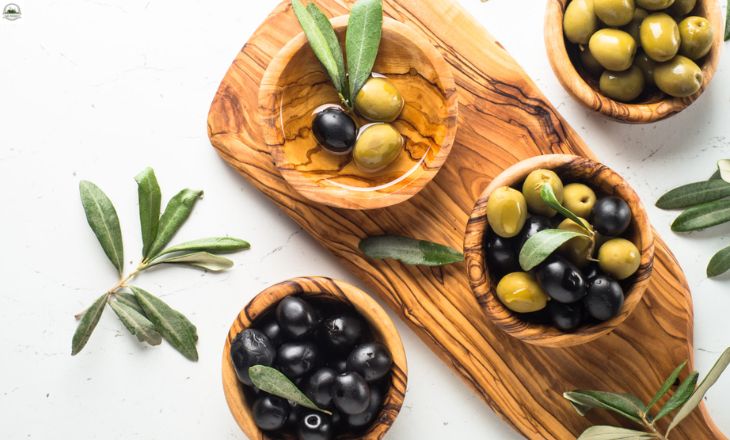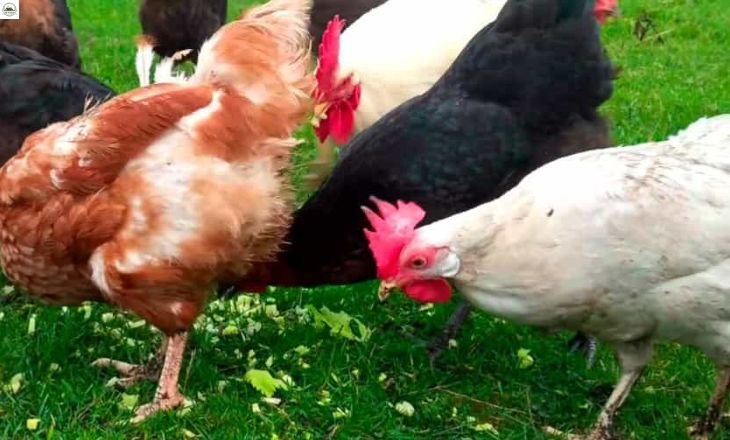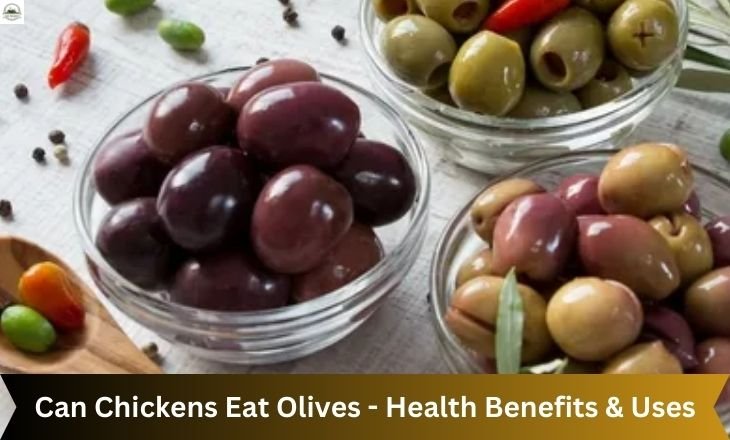Chickens love to eat a lot of different foods, but Can Chickens Eat Olives? This question has sparked interest among people who raise chickens. Some say olives could be a tasty snack for chickens, while others warn about possible risks.
In this article, we explore whether chickens can safely enjoy olives or if it’s better to avoid giving them these salty treats.
Can Chickens Eat Olives – Key Takeaways
- Chickens can eat olives in moderation.
- Be careful of the pits inside. They can be a choking hazard and have lots of sodium.
- Chickens should not depend on olives for their nutrition, even though they might like them as a treat.
How Should I Prepare Olives Before Giving Them to My Chickens?
Olives can be fed to chickens either raw or cooked, but it is important to remove the pit before feeding them to your chickens, as the pits can be a choking hazard. You can also chop or slice the olives into smaller pieces to make it easier for your chickens to eat.
The Health Benefits Of Olives
Olives are great for chickens because they contain important vitamins and minerals like vitamin E, iron, and calcium. Boost your chickens’ health with nutrient-packed olives! Discover how these vitamin-rich treats can enhance your flock’s vitality.
Chicken vitamins and minerals
Olives are good for chickens because they have important vitamins and minerals. They have Vitamin E, iron, copper, and calcium.
Vitamin E: Functions as a free radical scavenger
Calcium: Crucial for maintaining strong bones
Iron: Essential for the well-being of blood
Copper: Facilitates the uptake of iron
Calcium levels
Olives are tasty and healthy for chickens. They are rich in calcium, important for strong bones and eggshell formation. Including olives in your chicken’s diet can help them stay healthy and productive.
Cast iron
Iron is important for chickens because it helps make haemoglobin, which carries oxygen in the blood. Olives are a good source of iron and can help chickens stay healthy. They also have antioxidants that boost the immune system and help chickens grow better.
Natural antioxidants in food
Chickens can benefit from eating olives because they are rich in antioxidants like vitamin E and polyphenols. These antioxidants can boost the chickens’ immune system and improve their overall health.
Adding olives to their diet may help reduce inflammation and promote better gut health for the chickens.
copper oxide
Copper oxide in olives helps chickens stay healthy. Chickens naturally get this mineral from the soil when they peck at the ground. This boosts their immune system and can improve egg production.
Studies show that chickens with access to copper oxide have stronger immune systems and lay more eggs.
Vitamin e sources
Olives have Vitamin E, which is essential for chickens’ health. Vitamin E in olives is an antioxidant, protecting cells from damage by free radicals when chickens eat them.
- Incorporating olives into a chicken’s diet can improve their immune system function.
- To Vitamin E, olives provide chickens with healthy fats and amino acids, further boosting their nutritional intake.
- Olives have lots of Vitamin E. Poultry farmers can use olives to give their chickens the nutrients they need to stay healthy and perform well.
Types Of Olives
Olives come in different shapes, sizes, and colors, each adding a unique taste to food. One popular kind is the Kalamata olive, known for its deep purple color and fruity taste. These olives are from Greece and are often used in Mediterranean dishes to give them a strong flavor.
Another favorite type is the Castelvetrano olive from Italy. These green olives are buttery and slightly sweet, making them great for snacking or adding to appetizer platters.
The Manzanilla olive from Spain has a tangy and salty taste that goes well with cocktails like martinis or can be chopped up for pizzas. Trying different olives can give you new cooking ideas and enhance your dishes with unique flavors and textures.
Each type has its special qualities that can make your cooking better and introduce you to new delicious flavors.
What are healthy fats and proteins
Regarding chicken, healthy fats and proteins are essential for a balanced diet. Incorporating sources of healthy fats, such as olive oil or avocados, can help enhance your chicken dishes’ flavor and nutrient profile. These fats also provide necessary nutrients for overall health and well-being.
In terms of proteins, lean cuts of chicken breast are an excellent source of lean protein that can aid in muscle maintenance and repair. Additionally, incorporating other protein-rich foods like beans or legumes can further boost the protein content in your meals.
By choosing a variety of healthy fats and proteins for your chicken dishes, you can create flavorful and nutritious meals that promote overall health and wellness.
Nutritional Profile of Olives
Olives can improve the taste and health benefits of chicken dishes. They are rich in healthy fats that are good for the heart and can reduce inflammation. Adding olives to chicken recipes enhances the flavor and nutrition, making the meal more nutritious and delicious.
A balanced diet
When feeding chickens olives, it’s important not to give them too much salt. Limit the number of olives to avoid digestive problems and keep their diet balanced.
Fresh olives are better than processed or pickled ones because they have fewer preservatives and sodium. By adding olives to their diet carefully, chicken owners can improve the health of their flock with this tasty treat.
Black Or Green Olives
Choosing between black and green olives might be challenging if you’re a bold chicken looking for new food adventures. But don’t worry; each type has a unique flavor that can improve your dishes.
Black olives go well with earthy foods like roasted mushrooms and garlic, adding richness to your meals.
On the other hand, green olives pair nicely with tangy ingredients like feta cheese and tomatoes, creating a burst of flavors.

Black olives are like a mysterious stranger at a chicken party – intriguing and surprising. They have a strong taste that some chickens might need time to like, but they can add elegance to any dish once you get used to them.
On the other hand, green olives are like a friendly neighbour who always has a drink to share. Their bright colour and mild taste make them outstanding in savoury dishes and cocktails.
Can Chickens Eat Black Olives
Chickens can eat black olives in small amounts, but be careful because they have a lot of salt. Too much salt in black olives can make chickens sick, causing dehydration and kidney damage.
Chickens can’t digest the fats in olives well, making their stomachs work harder. Giving chickens healthier treats like fresh fruits and veggies instead of black olives is better.
Giving chickens hard-to-digest foods like black olives can mess up their diet and cause them not to get all the nutrients they need. It’s okay to give chickens a small piece of olive as a treat occasionally, but it’s important to make sure they eat a balanced diet that’s good for them.
Can Chickens Eat Green Olives
Chickens can eat green olives in moderation, but it’s essential to be mindful of the salt content. While a small amount of green olives can provide some healthy fats and vitamin E for your feathered friends, too many can lead to health issues due to the high sodium levels.
It’s best to offer green olives as an occasional treat rather than a regular part of their diet.
Can Chickens Eat Olive Oil
Chickens can eat olive oil in moderation for healthy fats and nutrients. But too much can make them gain weight and have tummy problems. Olive oil is good for chickens, but they still need grains, veggies, and proteins for their primary food.
A little olive oil now and then can help chickens stay healthy. It has antioxidants that boost their immune system and protect against stress. The good fats in olive oil can benefit their heart and blood flow.
Giving chickens a mix of foods with different nutrients, like olive oil as a treat, keeps them healthy and happy.
Can chickens eat canned olives
It’s important to remember that chickens have specific dietary needs and should primarily be fed a balanced diet of grains, seeds, fruits, and vegetables. Providing them occasional treats like fresh fruits or vegetables is fine, but avoiding processed foods like canned olives is best.
Risks of Feeding Olives to Chickens
Feeding chickens olives can pose several risks and health concerns. While olives are generally safe for chickens to consume in small quantities, they are high in fat content, which can lead to obesity and other health issues when overfed.
Sodium and Kidney Issues
Chickens, like humans, have sensitive kidneys that can be easily affected by high sodium levels in their diet. Sodium is essential for chickens but should be provided in moderation to avoid kidney issues. Excessive intake of sodium can put a strain on their kidneys, leading to various health problems such as dehydration and kidney damage.
Preparation and Moderation
When feeding olives to your chickens, remember to do it in moderation and prepare them properly. Olives can be a good treat for your chickens because they have antioxidants, but don’t give them too many. Too many olives can cause stomach problems and make the chickens gain weight. It’s best to provide olives as a snack instead of every day occasionally.
Foods that are poisonous to Chickens
Chickens should not eat certain foods because they can be poisonous. Avocado has a toxic compound called persin. Chocolate contains theobromine, which can be harmful or fatal to chickens in large amounts. Onions and garlic can damage chickens’ red blood cells and cause anaemia.

Conclusion
Chickens can eat olives in moderation as they provide essential nutrients and healthy fats. It is important to remove the pits and avoid feeding them too many at once to prevent potential health issues. It is always best to consult a veterinarian or poultry expert before introducing new foods to your chickens’ diet.
Olives can be a tasty and nutritious treat for your feathered friends when offered responsibly.
Remember to prioritize their well-being and dietary balance when selecting treats for your flock.
Consider adding olives to your chickens’ diet in moderation while keeping their health and nutritional needs in mind.
Frequently Asked Question
Do Chickens Need Water At Night?
Yes, chickens should always have access to fresh water, even at night.
How Many Times A Day Should I Feed Chickens?
Chickens should typically be fed at least twice a day, once in the morning and once in the evening.

